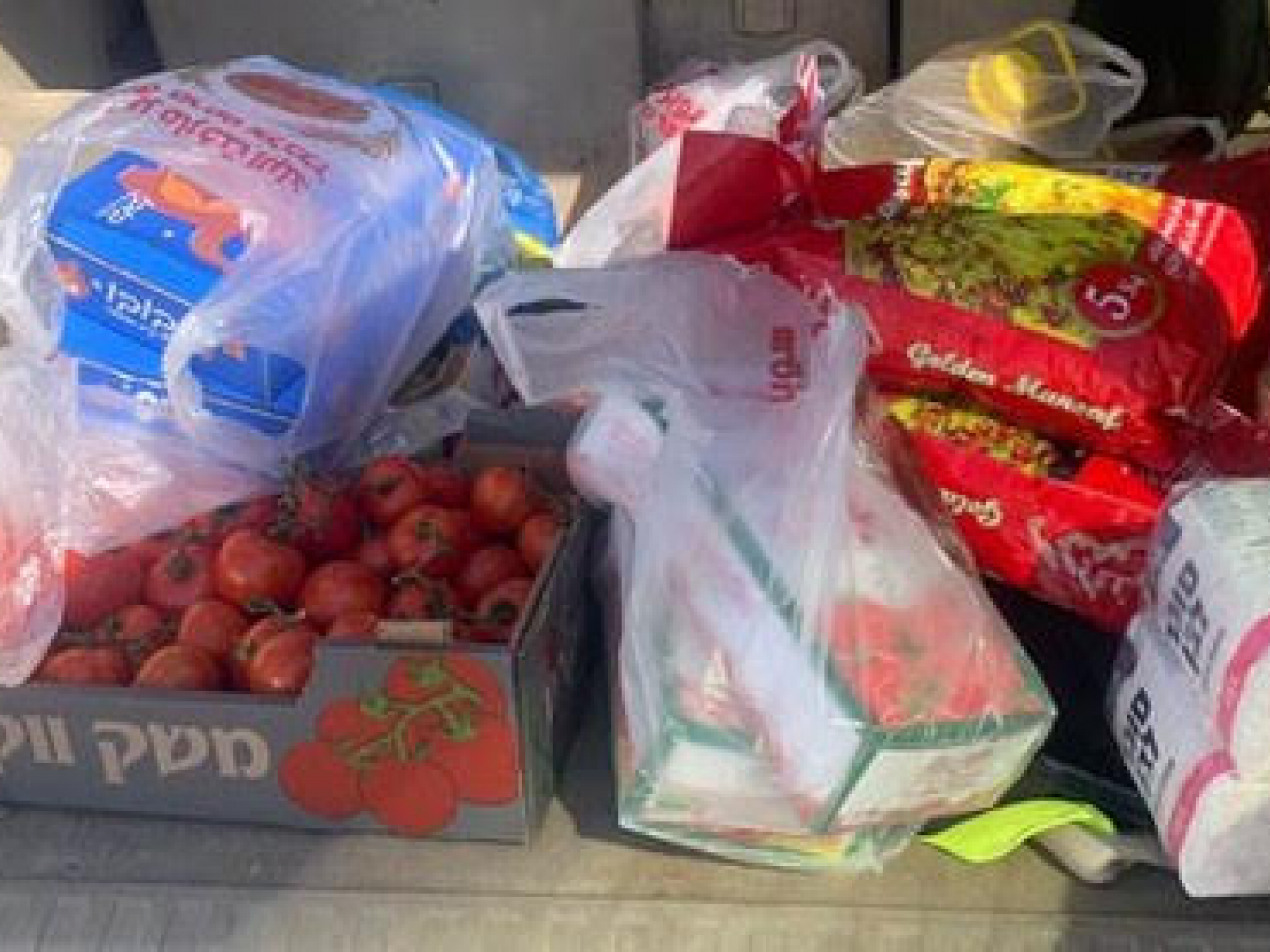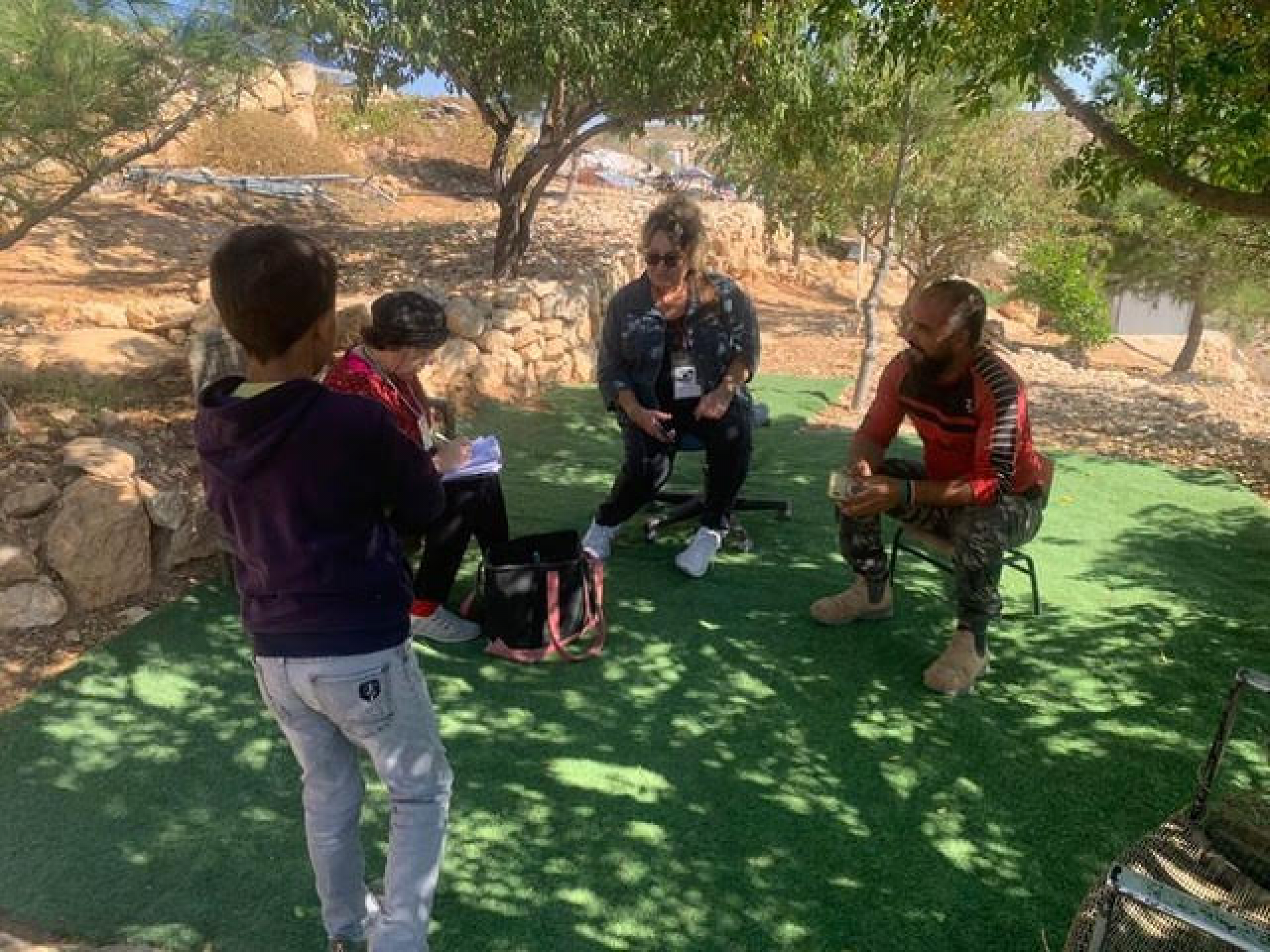Khalet al-Daba' - settler terror

1. We went out into the field despite worrying family members for our safety.
2. We started by shopping in Hura for two families in Khalet Al-Daba', which is southeast of At-Tuwani, as they requested, because they cannot go out freely, their vehicles were confiscated, they are targeted by settlers and the army. Funding - from donations raised by friends from Tel Aviv.
3. Passing Meitar, there are no workers going through to Israel.
4. To the East on Route 60. Amar Abu Awwad, whose compound was burned down by settlers as we reported, now lives in Wadi Nias, at the entrance to Samu'. Abu Safi underwent heart surgery safely, now lives in Samu'with his family.
5. We turn right to Route 317, towards Susiya and At-Tuwani. South of the road, the access roads to Rewan are blocked by piles of dirt. Two elderly Palestinian women drag themselves on foot towards the village, one using a cane. A military vehicle passes them. The entrance to the village is roughly in front of the rear southern entrance to Samu’ (the main entrance - on Route 60). On the way back we saw how people and supplies are transferred from vehicle to vehicle in the "back to back" method, because they are not allowed to travel freely from Samu’ to the villages, and the army checks them.
6. Cameras are now installed at the entrance to the Palestinian Susiya: Big Brother monitors all movements to and from Susiya.
7. We pass At-Tuwani and proceed on a dirt road which is only for 4x4 vehicles. A guard tent was set up by the people of Mufaqara to guard themselves at night. The army demands that the tent be destroyed.
8. We arrived at Khalet Al-Daba', to visit Jaber Ali Dababsa. At home are two of his five sons, Ritan and Ryan, who help us unload the groceries we brought. Jaber hosts us in his paradise in the shade of the trees on synthetic grass, all of Palestine could have been such a paradise if it weren't for the determination of the settlers with the backing of the state to destroy everything. Jaber emphasizes that there have never been any security problems with the residents of the area, meaning that the only reason for the effort to expel them from the so-called "fire zone", where the settlers are allowed to live and prosper, is ethnic cleansing.
There are about 90 people in the village, all from the Dababsa clan, about half of them children. There is a small school of 4 classes within the framework of "Tahadi" (the challenge) schools established by the Palestinian Authority to provide an educational solution for the children of the remote villages, and there are children who come to the school in At- Tuwani by bus (which we helped finance). But now the schools are not working because the teachers cannot come from Yatta.
Three weeks ago, settlers arrived in military uniforms - they are now being recruited into the IDF reserves as part of the "Regional Defense", designed to operate with the military forces in the defense of the country's territories. They broke windows at the school, beat people, detained his uncle at the base near Susiya and, when he was released, he was taken to a hospital because he was bruised. They also entered three houses, broke windows, a television and a washing machine, confiscated Jaber's computer and also a harmonica he bought in the private market on the grounds that it was stolen IDF property, that is, they carried out a sort of violent search of the house. The uncle, they thought he was detained by the police but it turned out that he was in the hands of other security forces. The Palestinians also engaged Adv. Riham (the details are at Nasser from Susiya). The Palestinians fixed the windows because winter is approaching and you have to prepare for the rain.
Jaber says that his father was born here in a cave. The clinic was in Hebron, in 'Aliya Hospital, where he was born. Part of the family lived in Carmel, part studied in Yatta, he only studied up to eighth grade because of blood feud problems.
The civil administration and the army have already destroyed his house five times, the last time in 2021, claiming that the construction was illegal. They also confiscated tents, uprooted trees, destroyed five water cisterns. And now the bullying is increasing, every day they come to scare, drive ATVs around the houses, enter the houses, all accompanied by the army. Sometimes there are military officers who are not violent settlers (like Issachar Talia...) who are willing to listen but don't really make a change on the ground. Some people broke down and moved to Carmel.
and the army have already destroyed his house five times, the last time in 2021, claiming that the construction was illegal. They also confiscated tents, uprooted trees, destroyed five water cisterns. And now the bullying is increasing, every day they come to scare, drive ATVs around the houses, enter the houses, all accompanied by the army. Sometimes there are military officers who are not violent settlers (like Issachar Talia...) who are willing to listen but don't really make a change on the ground. Some people broke down and moved to Carmel.
9. On the way back, in At-Tuwani, we meet an elderly Jewish volunteer from Australia. The BBC had just come to interview Hafez Hareini, the owner of the lands close to Ma'on Farm, the man who was attacked on his land by a settler who broke both of his hands, and it was he, the Palestinian, who was arrested and taken to the Ofer camp. Near his house there is a kind of hotel for the volunteers who come to At-Tuwani.
10. At the exit from At-Tuwani on the road, near the road leading to Yatta, there is a sign on a water facility "For all the soldiers and volunteers".
11. On the front page of the Haaretz newspaper the day after our shift, an ad from "Yesh Gvul" (There is a border) describing the transfer carried out by the settlers. Khalet al-Daba' is included in the list, among the communities that were brutally attacked.


